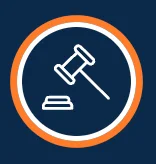If you have been injured in a truck accident, you may be entitled to substantial financial compensation. Trucking companies carry substantive insurance coverage to protect themselves in the event of accidents. In many circumstances, you can sue the trucking company to pay for your injuries. Reach out to Jordan Law Center today to schedule a free consultation with an experienced Greenville truck accident lawyer and learn more about your potential right to financial compensation.
Why Sue the Trucking Company?
In many cases, the individual truck driver may not have the assets necessary to pay for your injuries. The trucking company, however, has deeper pockets. Typically they have a large insurance policy and corporate assets to cover your damages. Personal injury cases that involve corporate defendants often result in much larger settlements and verdicts than those involving individuals.
The Trucking Company May Be Legally Responsible for Your Injuries
In personal injury law, there is a legal concept called respondeat superior. Translated from Latin, the phrase means “let the master answer.” Here, what the master is answering for is the acts of people who are working for them.
An employee is considered to be an agent of their employer. So long as what the employee does is within the scope of their job, the employer is legally responsible for their actions.
Personal injury law dispenses with any fiction that an employer and employee are two separate entities.
The practical application of this legal doctrine is that you can sue a trucking company when the driver who caused your action is an employee of that company. Some trucking companies hire their drivers as employees, while others enlist operators as independent contractors. You generally cannot sue a company when the accident was caused by an independent contractor.
When a truck driver is operating the vehicle on the clock, in furtherance of their job to make deliveries, their actions are the same as their employer. If the truck driver was taking their truck to run a personal errand, they would not be on the job and, therefore, this doctrine may not hold true.
Other Theories of Trucking Company Liability
There are other ways the trucking company itself can be negligent, including:
- Negligent hiring: the trucking company has an obligation to screen drivers before they hire, closely reviewing their driving and criminal records.
- Negligent retention: the trucking company similarly would need to fire a driver who has a poor safety record on the job.
- Inspections and maintenance: Trucks must be kept in roadworthy condition. The trucking company and the driver must perform periodic inspections on the truck and perform maintenance as needed. However, trucking companies often cut back on maintenance to pad profit margins or they keep trucks on the road because taking them out of service will cost money.
- Failure to perform drug and alcohol testing: Under federal trucking regulations, the trucking company must test for drugs and alcohol at the following times:
- Before the truck driver is hired
- When there is a reasonable suspicion that the truck driver is under the influence of drugs or alcohol
- At random during the course of their employment
- For alcohol, within eight hours after an accident and for controlled substances, within 32 hours after the accident
The trucking company has an obligation to ensure that federal trucking regulations and state laws are being followed, and they can be legally responsible for failing to take action when they learn that laws are being violated.
Evidence Against a Trucking Company That Can Help Prove Your Case
The trucking company will almost always try to defend themselves when you claim they should be held responsible for your truck accident injuries.
There are two categories of evidence in a truck accident lawsuit:
- Evidence that your lawyer would gather on their own while investigating the accident
- Proof that your attorney may obtain after a lawsuit has been filed through the discovery process
The latter category of evidence can be very important to your case. You may have some, but not all, of the proof that you need to hold the trucking company responsible for what happened.
Some of the evidence that you need may be in the trucking company’s hands, and they have a legal obligation to preserve the evidence (your attorney would put them on notice by sending them a litigation hold letter shortly after you hire them). The trucking company would need to turn the evidence over to you in discovery, so long as your requests are reasonable and relevant.
Some records that you may request from the trucking company include:
- Data from the truck’s electronic data recorder (also known as the “black box”)
- Maintenance and inspection records for the truck involved in the accident
- The safety record of the driver involved in the crash
- The driver’s drug and alcohol test results over the course of their employment
- Driving logs
- Any internal communications related to the driver’s safety or issues relating to the truck
This evidence may also be used to establish the trucking company’s negligence.
These sources of evidence may also be useful if you are trying to persuade a jury to award punitive damages. If you can establish gross negligence, or a culture of noncompliance with federal regulations, the jury may want to punish the trucking company and make an example out of them.
Contact a Greenville Truck Accident Attorney Today
Jordan Law Center has considerable trial experience in handling truck accident cases. These lawsuits tend to be more complex than the average car accident case. It is crucial that your lawyer has previously litigated and filed truck accident claims before.
You should reach out to us today to speak to a lawyer to discuss your case. We offer free, no-obligation consultations to prospective clients. Call us today at 864-808-1810 or message us through our website to talk to a lawyer. You do not need to pay us anything unless you win your case.







“There is not enough GREAT THINGS I could say about Jordan Law Center.”